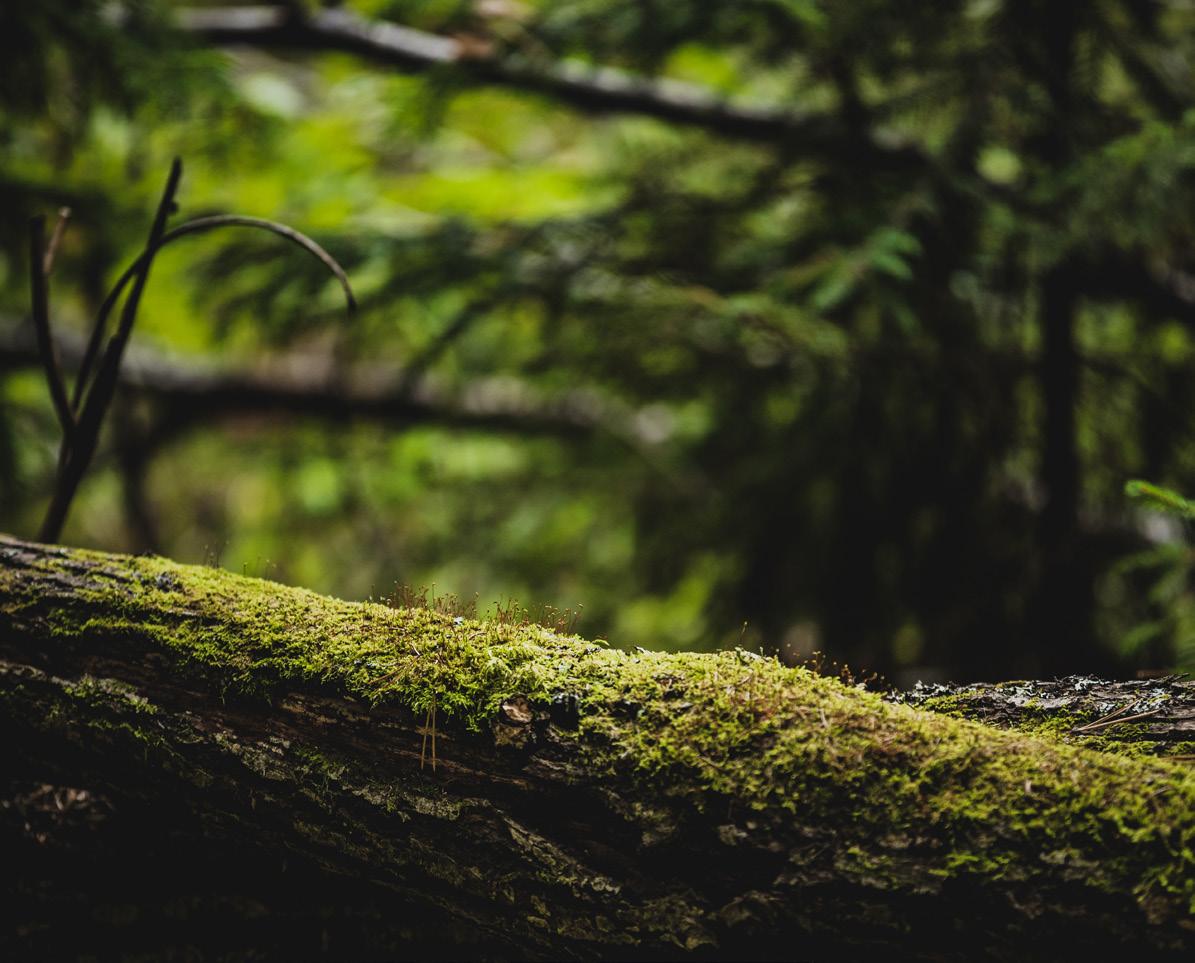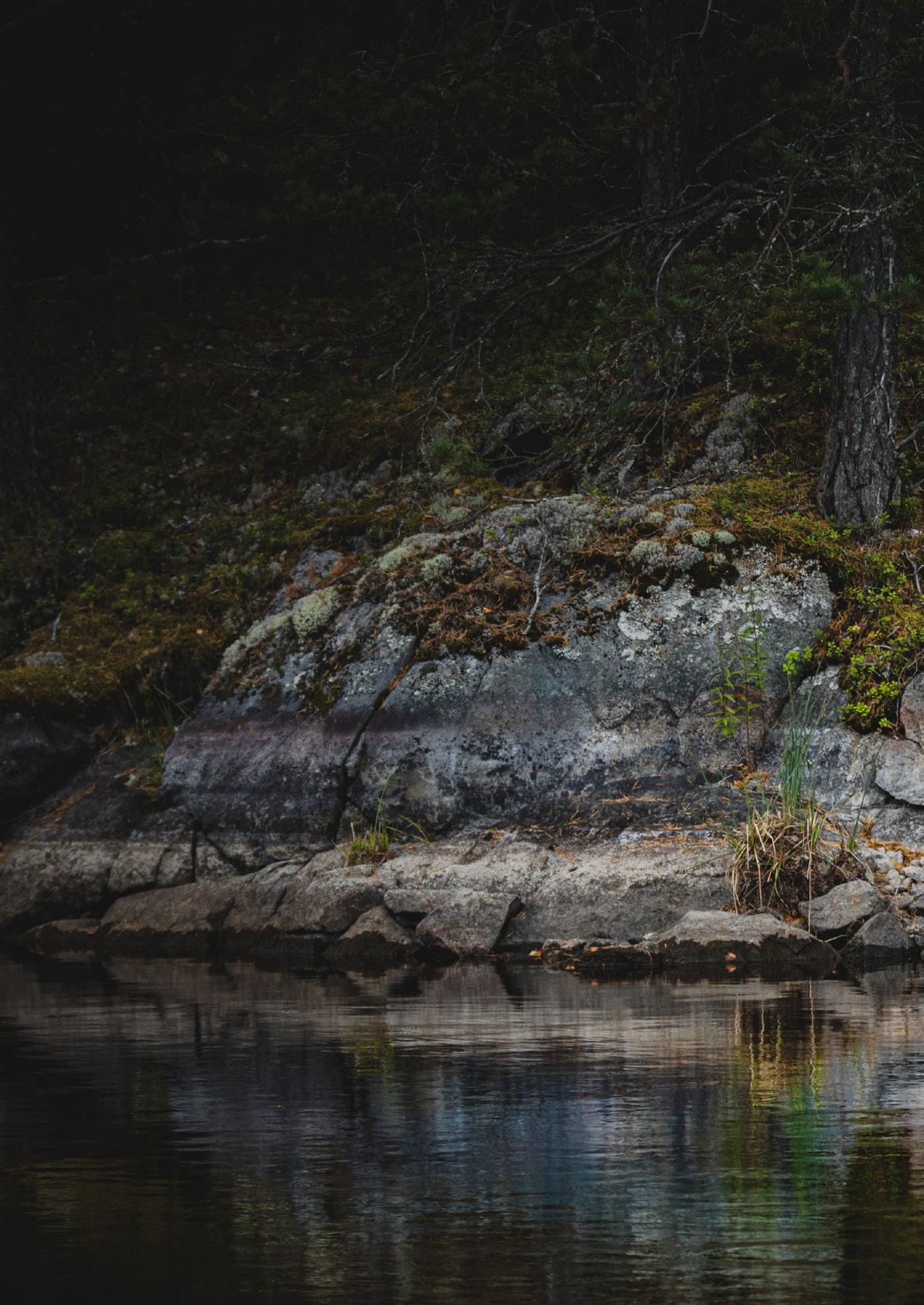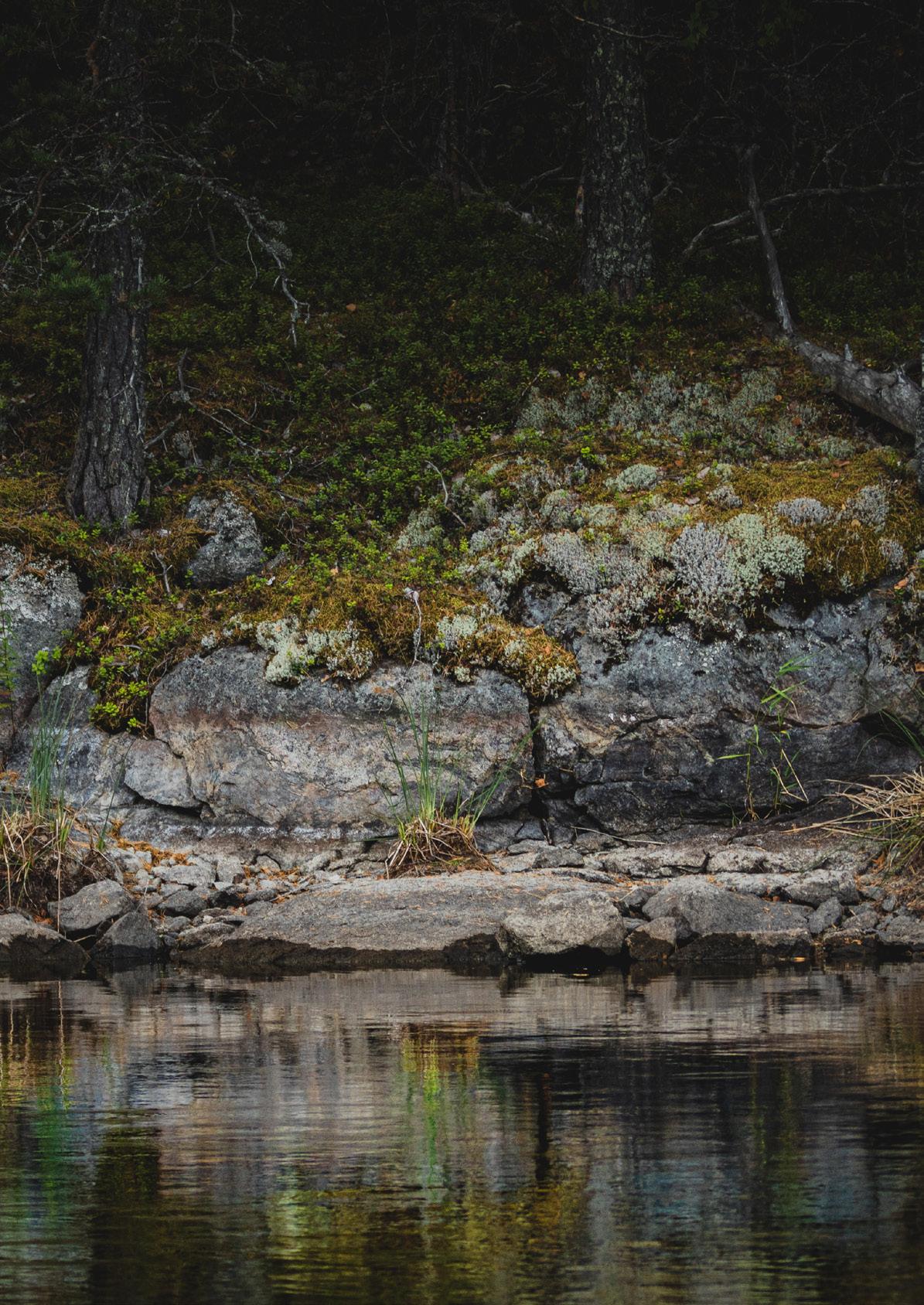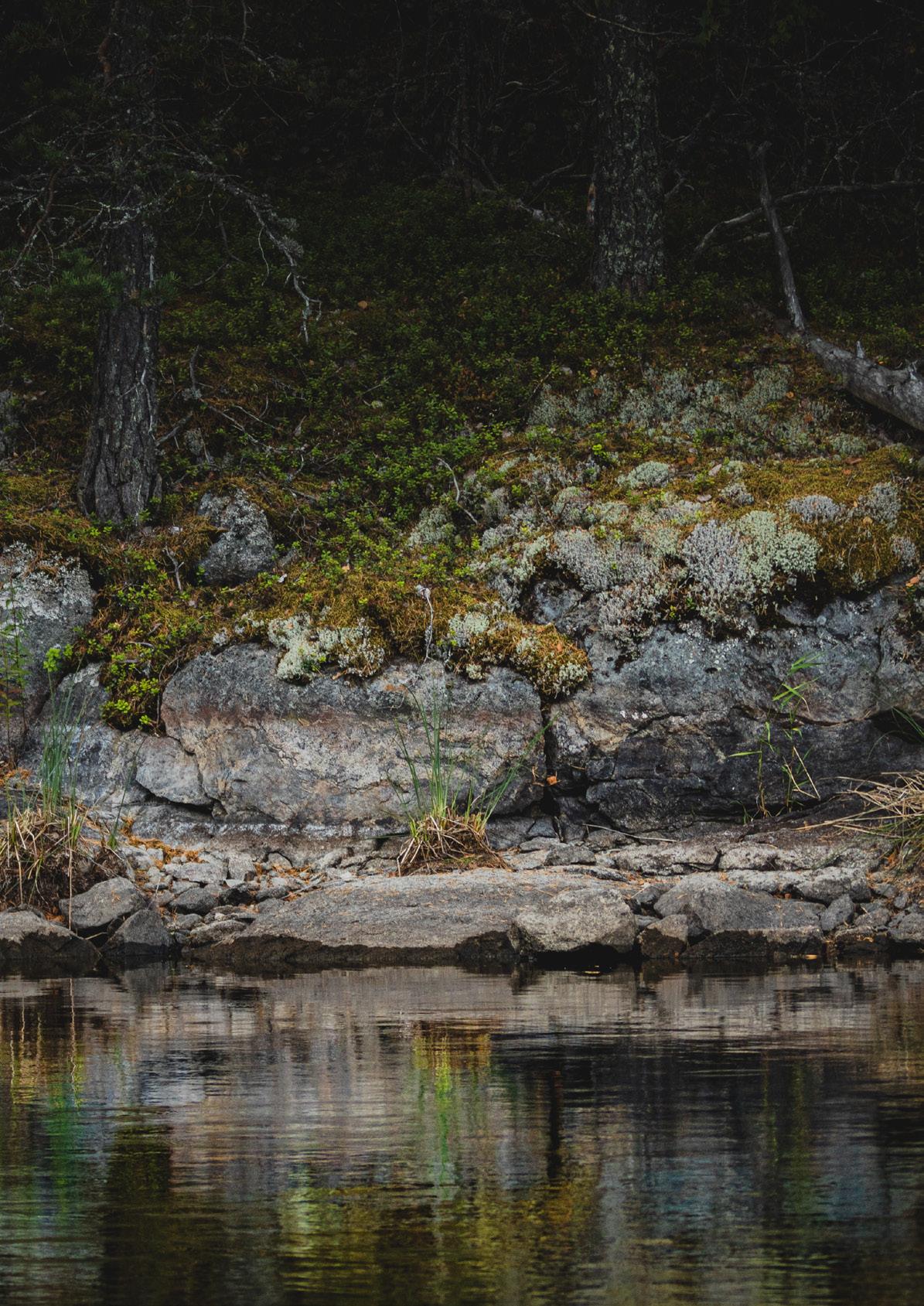
10 minute read
LUT Universitys´s carbon footprint in 2019
LUT UNIVERSITY´S CARBON FOOTPRINT IN 2019
LUT is committed to making its campuses carbon negative by 2024. In 2019 LUT revised its strategy and its action plans to reach this goal. Strategy 2030: System Earth solves vicious problems to save our planet.
LUT has calculated its carbon footprint according to the Greenhouse Gas Protocol and has set targets for all three scopes of the protocol.
In 2019, LUT’s total carbon footprint was 2054 t CO2 ekv. This was the first time LUT employed the world’s most widely used greenhouse gas accounting standard, the Greenhouse Gas (GHG) Protocol, to calculate its carbon footprint. LUT does not have comparable GHG Protocol measurement data from previous years.
In the GHG Protocol, greenhouse gas emissions are classified into three scopes. Scope 1 and 2 are mandatory to report, and scope 3 is voluntary and the most challenging to monitor. In 2019, LUT included all these three scopes in its carbon footprint calculations.
LUT’s Total Carbon footprint 2054 t CO2 ekv
SCOPE 1: 18.8 t CO2 ekv Direct emissions from LUT-owned and controlled resources including emissions from four owned cars.
SCOPE 3: 2035.2 t CO2 ekv Emissions are all indirect emission – not included in scope 2 – and emissions that are linked to the value chain and operations of LUT, e.g. business travel via CWT, food at LUT Buffet, construction, maintenance.
SCOPE 2: 0 t CO2 ekv Indirect emissions from the generation of purchased energy. LUT´s electricity comes 100 % from renewables and therefore it is considered that emissions at the generation are zero. The GHG Protocol says that the company does not account for GHG emissions from operations in which it owns an interest but has no control. The owner of the buildings and the buyer of the district heating, SYK Oy, has included district heating in its own calculations and already compensated all the emissions. That’s why the district heating is excluded from the calculations.
Water consumption per year
2017: 16 731 m3
2018: 15 674 m3
2019: 14 114 m3
Consumption per person is 3.18 m3/person
Amount of waste 181 tons, from which:
91 t of waste recycled (50,3 %)
90 t of waste to energy production (49,7%)
0 t of waste sent to landfill – 0 (0%)
LUT UNIVERSITY'S CARBON FOOTPRINT IN 2019
Food 33%
Commuting 22%
Business travel 20%
Publishing 8%
Waste 3%
Construction 3%
Research 3%
Education 3%
Advertising 3%
Maintenance 1%
LUT fleet 1%

LUT & SUSTAINABLE DEVELOPMENT GOALS
SDG 1 | NO POVERTY
» The employment rate of our graduates is 97%. » LUT organizes an annual Projects &
Part-time jobs event, where companies recruit our students. » In 2019, we awarded a scholarship 83% of persons who are required to pay a tuition fee and who accepted a study place. the amount of biowaste and sells food out shortly before closing time to minimize line loss. free process to produce protein from air with emission-free electricity and without land use. response diversity of wheat. Because of climate change, food security requires more crop cultivars that exhibit different responses to climatic conditions. services and Happiness through Health activities with the aim of increasing social, mental and physical well-being and job satisfaction.
Occupational safety aims to reduce hazards at work. promote students’ well-being on the campuses.
It annually organizes a Well-being Week for all campus students and staff. influencing the use of quantified self-tracking wearable devices among older adults and in organisational use. the LUT Junior University, open university instruction, Educational Services for
Companies and The Finnish Institute of
Technology. developed in recent years. The contents of sustainable development are integrated into degree programmes and all new students receive an introduction to sustainability at LUT. accreditation, which is a guarantee of high quality.
SDG 5 | GENDER EQUALITY
» LUT hosted the event Shaking Up Tech, which encourages young women to enter the world of technology. » The objective of the equality plan is to promote equality and prevent and eliminate discrimination.
The human resources committee follows and evaluates the realization of equality. » At the end of 2019, the share of female employees was 45%. A total of 27% of undergraduate students
SDG 2 | ZERO HUNGER
» The campus restaurant constantly monitors » Research with VTT created a new emission» Sustainability Science Group investigated the and 37% of postgraduate students were women.
SDG 6 | CLEAN WATER AND SANITATION
» LUT regularly monitors its water consumption.
In 2019, the consumption was 3.18 m3 per person.
LUT minimizes its water use with automatically closing water taps and campus vegetation which does not require irrigation. Drinking water is provided free of charge. » Research into water responds to complex water treatment needs and resource recovery from wastewater.
The research also benefits local water systems: a pumping station improves water quality in Lake Saimaa, and mud balls clean local waters in Lake Nukkajärvi. » Water-related education is provided e.g. in the Master’s
Programme in Water Technology, in the Junior University, and

SDG 3 | GOOD HEALTH AND WELL-BEING
» Employees are offered the occupational health
» The aim of the well-being committee is to
» Research in the field of software programming examined factors
SDG 4 | QUALITY EDUCATION
» Lifelong learning is supported through
» The sustainability skills of graduates have » Several of degree programmes have passed international through the scientific platform SAWE – Safe water for all.
SDG 7 | AFFORDABLE AND CLEAN ENERGY
» LUT’s solar panels produce almost 5.4% of the electricity LUT consumes, and 100% of the energy LUT purchases is renewable. Goals for energy efficiency are shared with the property operators. » LUT’s research shows an economically viable pathway to a global carbon neutral electricity system by 2050. » The LUT School of Energy Systems offers education in energy engineering, electrical engineering, sustainability science and mechanical engineering.
Energy education is provided also through the research platform REFLEX.
SDG 8 | DECENT WORK AND ECONOMIC GROWTH
» LUT has committed to the European Charter for
Researchers, the European Commission’s principles of good human resources policy and the Society’s
Commitment to Sustainable Development. LUT’s
Code of Conduct assures that every member of our academic community has equal opportunities. » LUT’s business ecosystem includes research and education units, LUT’s business accelerator Green
Campus Open (GCO), the J. Hyneman Center (JHC) for rapid prototyping, the LUT Entrepreneurship Society LUTES, and the cleantech seed investor Green Campus Innovations Ltd (GCI). » LUT promotes entrepreneurial skills e.g. in schools and in the
Master’s Programme in International Business and Entrepreneurship.
SDG 9 | INDUSTRY, INNOVATION AND INFRASTRUCTURE
» LUT promotes society’s transition to carbon neutrality through electrification and power-to-x technologies. P2X is applicable to the production of synthetic fuels, chemicals and edible proteins.
Raw materials for these products include carbon dioxide captured from the air. » Green Campus Open supports turning LUT’s research into business. LUT’s research resulted in 29 inventions in 2019, and there were 52 active spin-offs which had been established at least three years ago. » Clean energy, water and air are life-giving resources for which we seek new solutions with our study programmes in technology and business.
SDG 10 | REDUCED INEQUALITIES
» The goal of the Fusion Grid project is to provide network connections and electricity in developing countries to enable better opportunities for education, work and business activities. » By supporting the sustainable renewal of business, the LUT School of Business and
Management helps to eradicate inequality in the working world. » LUT has signed the Erasmus Charter for Higher
Education. In 2019, there were 205 outgoing and 268 incoming exchange students at LUT. In addition to academic staff, the mobility of other staff is supported through the Erasmus and
FIRST programmes.
SDG 11 | SUSTAINABLE CITIES AND COMMUNITIES
» The mobile application CitiCAP for personal carbon trading was invented to help the city of
Lahti to encourage its citizens towards more ecological mobility and to reduce emissions from transport. » Master’s students around Europe analyse genuine industrial cases in the e-CirP project, where the circular economy is embedded into product design and optimization. » The LUT Junior University raises responsible urban citizens from preschool to upper secondary school, encouraging them to contribute to the sustainable development of the city through their own activities.
SDG 12 | RESPONSIBLE CONSUMPTION AND PRODUCTION
» LUT has updated its waste policy and waste separation instructions: 0% of LUT’s 181 tons of waste will be landfilled. Our campus restaurants have biowaste scales to monitor biowaste volumes.
LUT takes environmental responsibility into consideration in all procurements. » A total of 59% of the EU’s plastic waste comes from food packaging. We are saving the world by better packaging solutions with our partners in the project PackageHeroes. » The LUT School of Business is committed to the Principles for
Responsible Management Education, which aim to implement sustainable values in education and research. The Master’s
Programme in Supply Management offers competencies for managing global supply networks to increase sustainability.
SDG 13 | CLIMATE ACTION
» LUT is committed to carbon negativity by 2024.
Our carbon footprint is calculated in accordance with the Greenhouse Gas Protocol and it includes each of the three related scopes. » Combating climate change and securing clean air are key questions that humanity needs to solve. LUT uses applied mathematics and climate modelling to promote these issues. » According to the 2019 Master’s graduate surveys in both technology and business administration, the sustainability expertise developed in studies at LUT is above the national average.
SDG 14 | LIFE BELOW WATER
» AI is taught to recognise marine plankton and used to gather information on the state of the Baltic Sea, the global ecosystem and the impacts of eutrophication and climate change on water quality. » Computer vision identifies the endangered
Saimaa ringed seal, enables protection of the species and helps to see how it adapts to climate change. » Oil spill prevention in the Arctic can be improved with biowaste.
SDG 15 | LIFE ON LAND
» Ultrasound helps to recover valuable natural ingredients ecologically and has the potential to reduce losses in food chains. » Biotrail – a forest trail next to the campus, where you can learn how nature has inspired innovations. » Metsä360 – a new award to accelerate forest processing and support the growth of a responsible bioeconomy.

SDG 16 | PEACE, JUSTICE AND STRONG INSTITUTIONS
» LUT´s organizational structure, board of directors, advisory board and university collegium are transparent. LUT’s student union is consulted in decision-making. » The aim of LUT’s equality plan is to help LUT develop into a work community where all members of the community are treated with respect. Equal treatment is actualised in interactive situations, personnel management, recruitment, working conditions, salaries, and career development. A total of 80 nationalities are represented in the staff, and 20% of new students are international. » LUT’s accessibility statement assesses the accessibility of the LUT website in the light of Web Content Accessibility
Guidelines (WCAG) 2.1, levels A and AA.
SDG 17 | PARTNERSHIPS FOR THE GOALS » Local partnerships for sustainable development:
• A feasibility study for a pilot production plant for local synthetic fuels is started with a group of companies. The target is to produce carbon neutral fuels for transportation. • A member of the Greenreality, a network of the energy and environment sector’s companies operating in South Karelia. • Members in the cooperation group of the project
“Carbon Neutral South Karelia”.
» National partnerships for sustainable development:
• Professor Christian Breyer is a member of the
Finnish IPCC Working Group. • LUT and Wärtsilä join forces to model a future based on 100% renewable energy. • A member in the Sustainability and Responsibility
Working Group of Unifi.


» Global partnerships for sustainable development:
• Partner in an international competence centre (under the auspices of UNESCO) in mining. • Professor Jari Hämäläinen re-elected as
COST Scientific Committee Chair • Member of many international networks promoting sustainable development, such as the ISCN and the NSCN.







